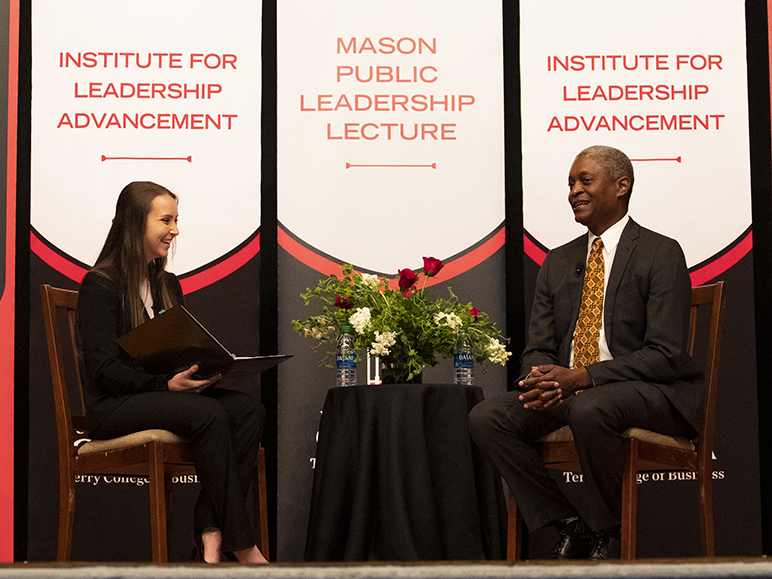One hallmark of Raphael Bostic’s leadership style is that everybody needs to be at the table if an organization is going to be at its best.
Bostic, president of the Federal Reserve Bank of Atlanta, brought his perspective on leadership and building successful teams to the University of Georgia on October 6 during the Mason Public Leadership Lecture, hosted by the Terry College of Business Institute for Leadership Advancement.
“Value, talent and insight can come from anyone,” Bostic said. “One of the things that I really work hard to do is to project an expectation that if you’re in a room, or if you’re in a meeting, or if you’re on a team, that you have things to bring to that team and that you will be bringing those things forward.”
Bostic told the audience that a team is strongest when everyone is contributing, and the same is true of society when all are contributing their best to the nation’s economy.
As president and CEO of the Federal Reserve Bank of Atlanta, Bostic oversees the bank’s activities from helping to establish monetary policy to bank supervision and regulation and payment services. An academic economist, Bostic served as a professor in the School of Policy, Planning, and Development at the University of Southern California before being appointed to his current role in 2017. He has served as an advisor and board member for many economic and community development organizations in California and nationally. He also served as assistant secretary for policy development and research at the U.S. Department of Housing and Urban Development from 2009 to 2011, in the aftermath of the 2008 housing crisis.
Bostic’s transition from academia to public leadership took a shift in mindset from one of self-reliance to one of interdependence. He said you have to trust your team and empower them to bring their best performance and their whole selves to work.
He shared a story of one of the first meetings he convened as assistant secretary at HUD. There was a large conference table in the room and yet everyone sat in the chairs against the walls. He was puzzled.
“They were sending the message that, ‘We don’t expect to actually have to say anything, and we don’t expect to have to participate in this meeting,’” he said. “And my view is that if you’re in the meeting, you should be participating or you should go do something else.”
He waited until everyone migrated to the table to start the meeting.
“I waited a long time, but you have to send the message that every staff member is valuable,” Bostic said. “You must be willing to do things to show that you take that seriously.”
That ethos of excellence through collaboration and inclusion is the same one that inspired Bostic’s efforts behind the Atlanta Fed‘s inclusive economy initiative.
When Bostic says inclusive economy, he refers to an economy where access to opportunity is readily available to people from all walks of life. Historically, these disparities in access to opportunity have grown from racial or gender discrimination but there are also geographic disparities. People in rural communities, for instance, without access to some infrastructure, financial tools or educational resources may not have the same access to opportunity as someone in metro Atlanta, he explained
That lack of opportunity hurts the economy and society as a whole, he said.
“If you don’t have access evenly distributed, people with the same levels of talent and with the same types of innovation will have wildly different outcomes,” Bostic said. “And we wind up being less for that.”
Bostic’s team is working in the communities that comprise the Federal Bank’s sixth district, which includes Georgia, Alabama, Florida and parts of Tennessee, Mississippi and Louisiana, to identify barriers to economic success and what can be done to eliminate them.
“One of the missions of the Federal Reserve is to maximize employment,” Bostic said. “You get maximum employment when everyone who wants a job can find a job, but that’s not enough. That job also must be one where they can reach their maximum potential…. If we can get to that, the sky is the limit on where this country can go.”
The Mason Public Leadership Lecture is supported by a grant from Keith Mason, a lawyer and alumnus of the Terry College. It is part of the Terry Leadership Speaker Series presented by the college’s Institute for Leadership Advancement. The institute was established in 2001 to develop values-based, impact-driven leaders who serve their communities and organizations.

